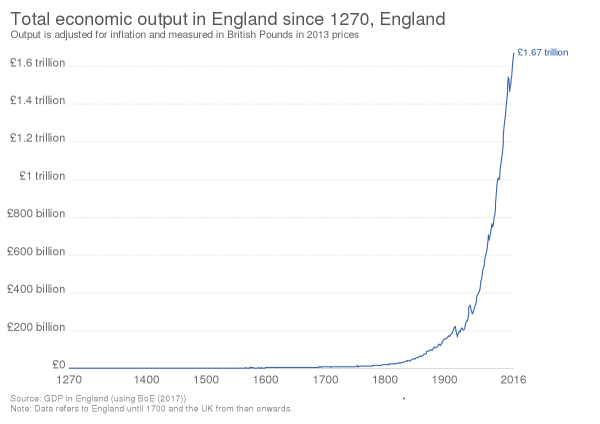Investment Outlook Second Quarter 2022: What was the Secret Sauce?

Since the dawn of civilization, standards of living tend to improve marginally from one generation to the next. However, history is punctuated with exceptional periods of rapid progress. For instance, Stone Age humans experienced a dramatic improvement in their quality of life when they began to utilize fire. Similarly, rapid progress is evident in population and economic data dating back to the 18th century. This drives the question, what was the catalyst that kicked off the explosive growth of the last 300 years?
Deirdra McCloskey, an economics professor at the University of Illinois Chicago, theorizes the origin to be in the emergence of liberal democracies. Much can be traced back to the English Bill of Rights, which was enacted in 1689. The Bill both granted rights to the people and removed power from the monarchy, striking a fatal blow to British royal absolutism. The ideas from the European Age of Enlightenment, particularly John Locke’s phrase “life, liberty, and property,” would serve as guideposts for the American and French Revolutions and the resultant constitutional democracies near the end of the 18th century. Throughout the 19th century, liberal democracies sprouted throughout Europe and the Americas, leading into the 20th century in which the liberal democracies were on the winning side of World Wars I & II.
Over this 300-year period, the democratic nations became subject to their own citizens in a stunning reversal of the centuries prior. Citizens were granted unalienable rights, and these rights were protected by strong laws and effective court systems. No longer did a perpetual ruling class expropriate the fruits of the nation’s labors, which unleashed the ingenuity of people to improve their own lives. The limits on government protected the liberty of citizens to trade, enter contracts, own patents, raise capital, and own and operate private enterprises. Liberal society gave everyone permission to change careers, start a business, or learn a new profession. The interests of the industrious were protected from the first inkling of an idea. These developments are what created the “secret sauce.” McCloskey calls it “equality of permission,” or as they say in Britain, “allowing people to have a go.”
Guaranteeing the rights of citizens enabled the meteoric rise in innovation and productivity. The resulting improvements in standards of living are perhaps best summarized by the increase in global life expectancy, which in just the last 60 years has increased from 53 to 73 years. Unfortunately, there are still nations in which the expropriation of individual property by the ruling class is commonplace. In Russia, it is believed that Vladimir Putin has discreetly seized ownership of large portions of Russia’s energy companies. In China, the constitution still prevents individuals from owning land or natural resources, and the regime mandates partial state ownership of important businesses at will. Both countries use heavy-handed “regulation” as a guise to steal the hard work of their citizens, in a fashion not so different from the royal decrees of centuries ago. For the continuation of the upward trend in global prosperity, the remaining persistently exploitative governments must no longer subjugate their citizens but instead serve them.
For those of you interested in seeing Deirdra McCloskey discuss this topic see this link: The Origins of Human Progress | Cato Institute

